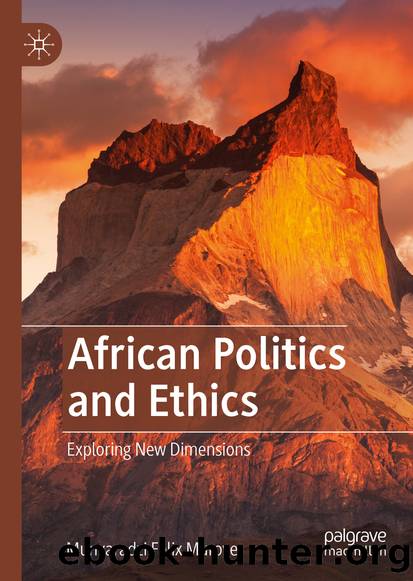African Politics and Ethics by Munyaradzi Felix Murove

Author:Munyaradzi Felix Murove
Language: eng
Format: epub
ISBN: 9783030541859
Publisher: Springer International Publishing
Wilson, N.H. 1923. The Development of Native Reserves. Southern Rhodesia Native Affairs Department Annual (NADA), Vol. II: 86â96.
© The Author(s) 2020
M. F. MuroveAfrican Politics and Ethicshttps://doi.org/10.1007/978-3-030-54185-9_5
5. Politics of Tradition and African Identity
Munyaradzi Felix Murove1
(1)Religion, Philosophy, and Classics, University of KwaZulu-Natal, Scottsville, South Africa
Munyaradzi Felix Murove
Email: [email protected]
In most of the discourses that are proffered by African politicians, be they in leadership, politics, economics, religion or education there has been a persistent recourse to the values of African traditional society. It is with reference to African traditional society that one can discern their ethical point of view on various social, economic and political issues. Even though the attitude of African politicians has been imbued in an aura of ambivalence where traditional Africa was sometimes condemned and in other instances appreciated, the recourse to African traditional society socio-economic and political model to emulate has remained a perennial theme. The African traditional society has been presented as the ideal society upon which to reconstruct the post-colonial African society. What it means to be an African was to be found in African traditional society prior to the advent of settler colonialism.
Thus the motif of reconstructing African post-colonial society on the foundations of precolonial African society is a byproduct of the dehumanization to which the African has been subjected at the hands of colonial administrators, Christian missionaries, Western anthropologists, colonial historians, social evolutionists and ethnographers. In most of the academic disciplines that were taught during colonialism, the humanity of an African was bastardized to such an extent that she or he was regarded as a lesser human being in comparative to the humanity of the so-called civilized societies. Among the majority of colonial scholarship, it was the humanity of an African which inevitably remained an existential perennial question to them.
From a religious perspective, it was asked whether Africans were endowed with a soul, and whether they were created in the image of God. Anthropological and ethnological studies created a grand narrative of Africans as primordially barbaric and primitiveâan element that can be objectively observed from their tendency to live in communities of tribes and ethnic groups or clans. The existence of Africans prior to colonialism and Christianity was imagined as not different from the existence of other wild animals. In this pre-colonial mode of existence, there were neither civilization nor scientific discoveries. On those occasions when such colonial narratives of pre-colonial African societies were spiced with the theory of social Darwinism, Africans were portrayed as a laboratory case study of the state of humanity prior to civilizationâpre-colonial Africans represented the past of civilized Western societies.
The narrative of ethics in African politics can be seen as an ethical narrative that was aimed at protesting against the colonial and apartheid experiences of dehumanization through the politicization of ethnicity. Thus the concept of African tradition was abused by colonialists for expedient colonial political purposes. As we have seen previously, the idea of organizing the colonial African society into reserves and homelands found its justification on what the colonialists saw as the imperative of enabling the colonized African to preserve his or her traditions and identity.
Download
This site does not store any files on its server. We only index and link to content provided by other sites. Please contact the content providers to delete copyright contents if any and email us, we'll remove relevant links or contents immediately.
The remains of the day by Kazuo Ishiguro(7551)
Tools of Titans by Timothy Ferriss(6946)
The Black Swan by Nassim Nicholas Taleb(6190)
Inner Engineering: A Yogi's Guide to Joy by Sadhguru(5896)
Giovanni's Room by James Baldwin(5878)
The Way of Zen by Alan W. Watts(5800)
The Six Wives Of Henry VIII (WOMEN IN HISTORY) by Fraser Antonia(4790)
The Power of Now: A Guide to Spiritual Enlightenment by Eckhart Tolle(4755)
Astrophysics for People in a Hurry by Neil DeGrasse Tyson(4620)
Asking the Right Questions: A Guide to Critical Thinking by M. Neil Browne & Stuart M. Keeley(4574)
12 Rules for Life by Jordan B. Peterson(3734)
The Ethical Slut by Janet W. Hardy(3503)
Skin in the Game by Nassim Nicholas Taleb(3460)
Housekeeping by Marilynne Robinson(3401)
The Art of Happiness by The Dalai Lama(3384)
Double Down (Diary of a Wimpy Kid Book 11) by Jeff Kinney(3272)
Skin in the Game: Hidden Asymmetries in Daily Life by Nassim Nicholas Taleb(3264)
Walking by Henry David Thoreau(3234)
12 Rules for Life: An Antidote to Chaos by Jordan B. Peterson(3200)
